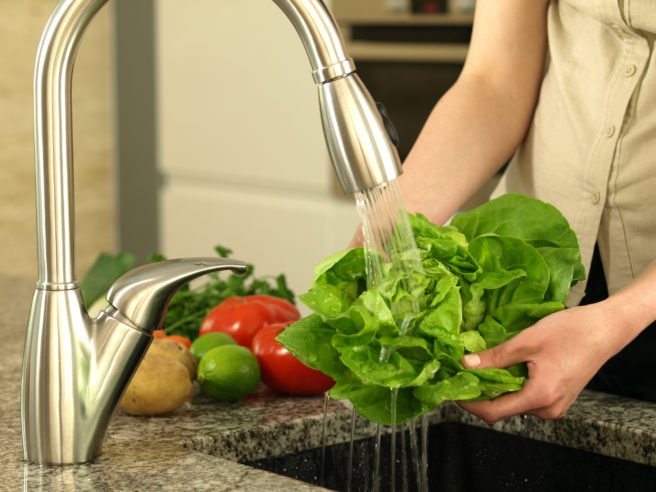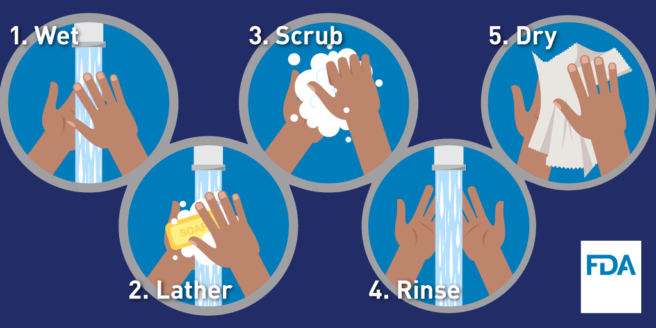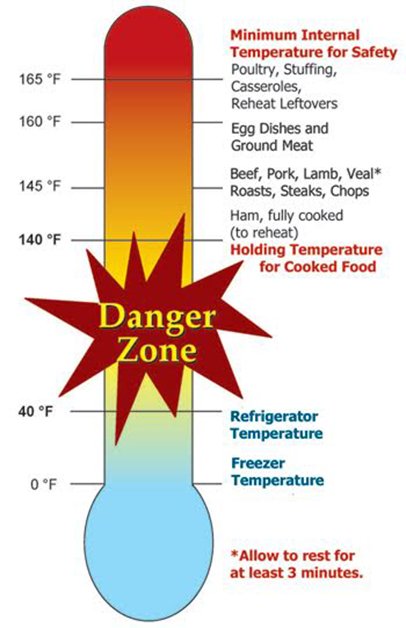It’s the Fourth of July weekend and with that comes the expectation of lots of food, time with friends and family and fireworks. Prep for the heat, review firework safety and read the following food safety tips to keep everyone safe this Independence Day.
Holiday events are often inter-generational affairs, which means that those most vulnerable — elderly parents, pregnant women and young children — to food poisoning will be enjoying the holiday spread. Because of this, it is best to go the extra mile to make sure the food is safe for everyone.
Foods to avoid if you want to be extra safe this holiday weekend:
Starting with the obvious, unpasteurized or so called raw milk should be avoided. Cows can be infected with all types of bacteria, and though some argue that milk loses nutrients during pasteurization, this is false.
Similarly, raw juice and other beverages can be dangerous. Skipping pasteurization means increasing the risk of contamination by bacteria, viruses and parasites. For the safety of you and your friends, stick to pasteurized drinks and dairy products such as cheese.
Subs or hoagies are a popular picnic meal, but as tempting as it may be, raw sprouts should be avoided. They are dangerous because of their growing process. The seeds are sprouted in standing water that can grow bacteria. There have been too many outbreaks to not pay attention to the risk of sprout contamination.

With all the work put into throwing a party or feeding a large group of people, it may be tempting to buy prewashed or precut fruit, but the more people handling and processing food means more chances for contamination. So to be extra safe, wash and cut the fruit yourself, or have a whole fruit salad bar.
For the same reason, precut vegetables are an added risk. This is especially true of lettuce, like romaine, which has been linked to outbreaks in the past. Wash your vegetables and cut them yourself to be safe.
Raw or undercooked eggs can carry Salmonella, which is a great reason to make sure any egg at your party or picnic is fully cooked. Raw eggs should not be used to make homemade ice cream. Use other pasteurized egg products from the dairy section of the grocery store.
Undercooked meat is also a concern and should be given extra attention. All meat should be thoroughly cooked. That means that sushi or other undercooked meat is not the best choice for this holiday party. If you’re grilling, keep the burgers and steaks well done. Meat needs to be cooked to 160 degrees throughout to kill bacteria that could cause E. coli or Salmonella.
Whether we saw it on a sitcom or heard it from a friend, everyone has seen or heard of raw oysters and other raw shellfish food poisoning stories. And foodborne illness linked to shellfish has increased dramatically because of global warming. Warmer water increases microbial growth, which ends up in filter feeders such as oysters. Better safe than sorry, leave the shellfish in the water.
Speaking of water, unfiltered water can contain animal feces, Giardia, and any number of bacteria. Make sure kids running around the lake and stream don’t get thirsty and take a drink.
Lastly, uncooked flour can spread bacteria such as E. coli. In 2015 and 2016, 56 people developed E. coli infections from eating uncooked flour. Raw cookie dough treats have been gaining popularity, but it’s important to remember that these treats require that the flour to be cooked before the dough is made.
More important food safety tips for the weekend:
Wash hands
It is important to follow proper handwashing steps before, during, and after preparing food to prevent bacteria from transferring from your hands to your meal.

According to a recent USDA consumer research, 56 percent of participants didn’t attempt to wash their hands during meal preparation. This is a major drop in handwashing attempts from the prior years of research.
In addition to low attempts at handwashing, roughly 95 percent of participants failed to wash their hands properly. The most common reason in the study for unsuccessful handwashing was failing to rub hands with soap for at least 20 seconds, followed by not wetting hands with water as a first step.
There are five steps for proper handwashing: wet hands, lather with soap, scrub for 20 seconds, rinse, and dry.
Use a food thermometer
Always use a food thermometer to check the internal temperature of your food to determine if it is safe to eat. The thermometer should be inserted into the thickest part of the meat, or through the side or burgers, for the most accurate temperature reading.
Use a food thermometer to ensure the following foods have reached their safe internal temperature:
Beef, pork, lamb and veal steaks, chops and roasts: 145 degrees F with a 3-minute rest
- Fish: 145 degrees F
- Egg dishes: 160 degrees F
- Ground meats (beef, pork, lamb, veal, venison, etc.): 160 degrees F
- All poultry (whole or ground): 165 degrees F
Separate raw meats, poultry and seafood from RTE foods
If you are planning to cook for the holiday weekend, inside or out, separate raw meats, poultry and seafood from other ready-to-eat (RTE) foods. Use one cooler for raw meats and poultry and another for RTE foods such as fruits, vegetables, cheese and desserts. Take two sets of plates and utensils for handling raw meats and for serving cooked foods to limit the chances of cross-contamination.
Watch the heat

Summer weather can be hot and humid, which means food won’t stay safe as long as it would indoors. When the temperature outside is above 90 degrees F, perishable food such as meat and poultry, dips and cold salads, or cut fruits and vegetables are only safe out on the table for one hour.
Keeping cold foods cold is an important step to keep food safe and healthy, so store them on ice, in coolers, or in your refrigerator and freezer.
Just like cold foods, hot perishable foods should be kept warm, above 140 degrees F, until they’re eaten. You can easily do this by moving these items to the side of your grill away from the main heat source, rather than taking them off the grill entirely.
Pathogen vectors
Bags of chips, fruit platters, condiments and other foods can be vectors for pathogens via cross-contamination by people if they don’t wash their hands.
Norovirus can be spread through foods and also in pools, and ponds, lakes and creeks can be a breeding ground for E. coli. Touching playground equipment in parks and backyards can lead to microscopic amounts of bird droppings on hotdogs, hamburgers and buns and other foods.
Parents should make sure children wash their hands correctly and use hand sanitizers before eating.
(To sign up for a free subscription to Food Safety News, click here.)












